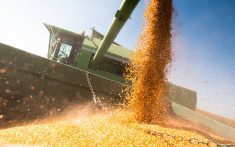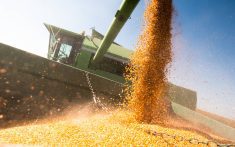Chicago | Reuters — U.S. soybean futures pulled back on Tuesday after reaching their highest level since June 2024 as China made hefty purchases of American supplies.
Wheat also reached a multi-month high, while corn futures edged up.
The U.S. Department of Agriculture confirmed China purchased 792,000 metric tons of American soybeans.
However, traders had largely factored in the sales already after Reuters reported on Monday that Chinese state-owned grain trader COFCO bought around 840,000 metric tons for shipment in December and January.
Read Also

USDA defends $12 billion subsidy amid farm economy challenges
As the U.S. Department of Agriculture prepares to dole out $12 billion (C$16.4 billion) in government subsidies next week, officials and economists at the agency’s annual forum near Washington defended the assistance as a necessary measure to prevent more farmers from financial ruin.
“Soybean futures were well supported yesterday by the Chinese news,” CHS Hedging said in a note.
January soybeans SF26 ended down 3-3/4 cents at $11.53-1/2 per bushel at the Chicago Board of Trade. The most-active contract Sv1 earlier reached $11.69-1/2.
CBOT December soft red winter wheat WZ25 closed up 2-1/4 cents at $5.46-1/2 per bushel. December corn CZ25 edged up 2 cents to close at $4.36-3/4 per bushel.
China still far from 12 million-ton target
China previously shunned U.S. soybeans during its trade war with Washington and is grappling with a glut after importing cargoes from South America. Monday’s purchases were the largest from the U.S. since a summit between U.S. President Donald Trump and Chinese President Xi Jinping in South Korea last month.
The White House said last month that China had agreed to buy 12 million tons of U.S. soybeans this year. China was still far from that target. However, those large volumes would justify the rally in soybeans in recent weeks, said Dennis Voznesenski, an analyst at Commonwealth Bank in Sydney.
“If China does buy the amount they talked about, that is a lot of soybeans and there is not a lot of time left in the year to buy them,” he said.
Meanwhile, a cargo of Argentine soybean meal cleared Chinese customs, two China-based traders said, marking the first such shipment since Beijing approved such imports in 2019 and signalling a new trade channel with the world’s top soymeal exporter.
— Reporting by Tom Polansek in Chicago, Peter Hobson in Canberra and Sybille de La Hamaide in Paris.

















